|
In the last column, I presented what were, in my humble opinion, the
Best Theater/Show Albums of 2002. Now it's time to
focus on the Best Vocal Albums of 2002.
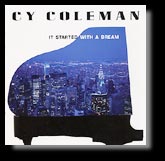 This year, the vocal album that graced my CD player more than any other
was Cy Coleman's It Started With A Dream. Coleman, who is
responsible for some of the liveliest shows written for the stage
(Sweet Charity, City Of Angels, The Life, Little Me and On The
Twentieth Century to name a few), as well as standards like
"Witchcraft" and "The Best Is Yet To Come," makes his songs come alive
with snazzy piano work and sure vocals. The real treat of the album is the
number of obscure gems, such as "I Really Love You" and "Somebody," although
the album is a delight from start to finish. This year, the vocal album that graced my CD player more than any other
was Cy Coleman's It Started With A Dream. Coleman, who is
responsible for some of the liveliest shows written for the stage
(Sweet Charity, City Of Angels, The Life, Little Me and On The
Twentieth Century to name a few), as well as standards like
"Witchcraft" and "The Best Is Yet To Come," makes his songs come alive
with snazzy piano work and sure vocals. The real treat of the album is the
number of obscure gems, such as "I Really Love You" and "Somebody," although
the album is a delight from start to finish.
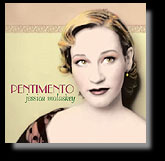 Given today's economic woes, Jessica Molaskey's album,
Pentimento, could not be more timely or topical. The album breathes
new life into 16 songs that helped get America through the Depression,
thanks to Molaskey's incredibly laid back vocals and a killer combo led by
Molaskey's husband, jazz great John Pizzarelli. Given today's economic woes, Jessica Molaskey's album,
Pentimento, could not be more timely or topical. The album breathes
new life into 16 songs that helped get America through the Depression,
thanks to Molaskey's incredibly laid back vocals and a killer combo led by
Molaskey's husband, jazz great John Pizzarelli.
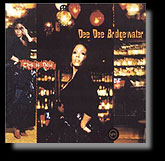 Dee Dee Bridgewater's jazz spin on Kurt Weill, entitled This Is
New, has been played on more subways and at more dinner parties than
any other CD received this year. Bridgewater imparts a delightfully
playful jazz sensibility on Weill's songs without ever obscuring the melody
or the lyrics, and her rendition of "The Saga of Jenny" alone is worth the price
of the album. Dee Dee Bridgewater's jazz spin on Kurt Weill, entitled This Is
New, has been played on more subways and at more dinner parties than
any other CD received this year. Bridgewater imparts a delightfully
playful jazz sensibility on Weill's songs without ever obscuring the melody
or the lyrics, and her rendition of "The Saga of Jenny" alone is worth the price
of the album.
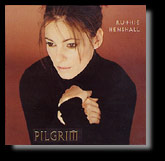 This year, Ruthie Henshall finely did it. After two enjoyable but
ultimately safe albums devoted to traditional musical theater fare,
Henshall released one of the most eclectic albums possible with
Pilgrim, and in so doing, created the perfect vehicle for her
smoldering voice and sharp intelligence. Who else would combine pop songs
by Kate Bush, Madonna, Enya, and Barbra Streisand with obscure theater
songs from King David and Peggy Sue Got Married, plus toss in
a few movie songs to make such an engaging, largely contemplative album? This year, Ruthie Henshall finely did it. After two enjoyable but
ultimately safe albums devoted to traditional musical theater fare,
Henshall released one of the most eclectic albums possible with
Pilgrim, and in so doing, created the perfect vehicle for her
smoldering voice and sharp intelligence. Who else would combine pop songs
by Kate Bush, Madonna, Enya, and Barbra Streisand with obscure theater
songs from King David and Peggy Sue Got Married, plus toss in
a few movie songs to make such an engaging, largely contemplative album?
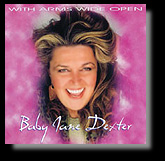 Baby Jane Dexter is as much a force of nature as she is an incredible
singer. To see her on stage is to watch a tsunami of passion, energy and
talent. While there is no way a thin silver disc is going to ever capture
all that power into its digital confines, you have to give it credit for
trying, especially when the result is the highly enjoyable album, With
Arms Wide Open. Baby Jane Dexter is as much a force of nature as she is an incredible
singer. To see her on stage is to watch a tsunami of passion, energy and
talent. While there is no way a thin silver disc is going to ever capture
all that power into its digital confines, you have to give it credit for
trying, especially when the result is the highly enjoyable album, With
Arms Wide Open.
Recorded live at the greatly missed Arci's Place, With Arms Wide Open
showcases Baby Jane at her best. From what may be the most appropriate
opening number ever incorporated into a show (the title song, which
welcomes the listener to the show and envelopes them in the raw energy
that is Baby Jane) to its closer (Dexter's traditional prayer to the
audience, Dylan's "Forever Young," which has been given a more subtle and
emotionally powerful spin this time), With Arms Wide Open provides
an hour of pure power and shear joy. Unlike previous albums, Dexter gives
equal time to standards on this one, with delightful results. Rodgers and
Hammerstein are surprisingly represented with the prayerful "Hello, Young
Lovers" and the playful "The Gentleman is a Dope." While Dexter still
brings down the roof with such high octane numbers as various odes to love
gone wrong, Ellington/Strayhorn's "Something To Live For" is a beautiful
exercise in subtlety and simplicity.
The show With Arms Wide Open won Dexter her third MAC Award last
year for Best Major Pop/Rhythm & Blues Performer, and the CD displays the
reason why in no uncertain terms.
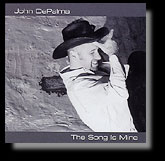 The strongest debut album of the year is also one of the best live
albums in recent memory. John DePalma lives up to the title of his album,
The Song Is Mine, by putting his stamp on each number through an
understated delivery that nails every word and emotion. Combine that with
exquisite song choices and you have a force to be reckoned with. The strongest debut album of the year is also one of the best live
albums in recent memory. John DePalma lives up to the title of his album,
The Song Is Mine, by putting his stamp on each number through an
understated delivery that nails every word and emotion. Combine that with
exquisite song choices and you have a force to be reckoned with.
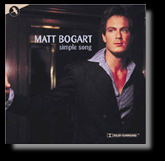 I said it before, but it bears repeating: in any other era of musical
theater, Matt Bogart would have been the darling of any songwriter who
wrote songs that coupled highly emotional lyrics with a powerful vocal
line (ie: Rodgers and Hammerstein or Lerner and Lowe). Bogart's solo CD,
Simple Song, is one of the best solo albums devoted to theater
songs to come our way in a long time, thanks to his subtle and emotionally
honest vocals. I said it before, but it bears repeating: in any other era of musical
theater, Matt Bogart would have been the darling of any songwriter who
wrote songs that coupled highly emotional lyrics with a powerful vocal
line (ie: Rodgers and Hammerstein or Lerner and Lowe). Bogart's solo CD,
Simple Song, is one of the best solo albums devoted to theater
songs to come our way in a long time, thanks to his subtle and emotionally
honest vocals.
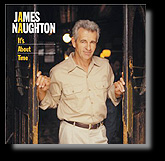 James Naughton's It's About Time is not only the most aptly
entitled CD of the year; it is also one of the best. Based on a recent
cabaret show he did at the Carlyle, It's About Time is an
incredible collection of standards and contemporary numbers by one of the
most sensual voices from Broadway or cabaret. James Naughton's It's About Time is not only the most aptly
entitled CD of the year; it is also one of the best. Based on a recent
cabaret show he did at the Carlyle, It's About Time is an
incredible collection of standards and contemporary numbers by one of the
most sensual voices from Broadway or cabaret.
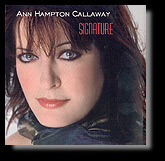 By focusing on songs made famous by other vocalists, Ann Hampton
Callaway took a huge risk on her CD, Signature. Luckily, Callaway
is more than up to the challenge. From the haunting "Tenderly" to the
playful "Twisted," she makes each song her own, creating one of her strongest
albums in the process. By focusing on songs made famous by other vocalists, Ann Hampton
Callaway took a huge risk on her CD, Signature. Luckily, Callaway
is more than up to the challenge. From the haunting "Tenderly" to the
playful "Twisted," she makes each song her own, creating one of her strongest
albums in the process.
Once again, the remaining slot for this list was a toughy. However,
unlike the theater/show list, the last vocal album was difficult to choose
due to the plethora of remarkable solo albums that were released in 2002.
Although I was torn between including Christine Andreas' Here's to the
Ladies, Susan Egan's So Far...or Brent Barrett's Alan Jay
Lerner album, all three of which are beautifully realized solo albums
focusing on musical theater, I ultimately had to go with Todd Murray's
When I Sing Low. While the three aforementioned albums are all
incredibly well done, they are also incredibly safe with nary a surprise
or element to quicken the pulse.
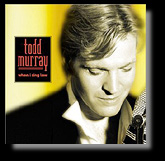 When I Sing Low, however, is an incredibly sensual album by a
performer who was unknown to me (and indeed, his website,
www.toddmurray.com, sheds no light on the subject whatsoever). With a
rich, deep baritone that caresses each note like a lover and a sparkling
way with a lyric, Murray interprets a variety of standards ("They Say It's
Wonderful," "Where or When," "Just In Time," to name a few) with a
swinging big band accompaniment. The true highlights of the album,
however, are the more rarely recorded songs: John Bucchino's haunting "If
I Ever Say I'm Over You," Fischer/Carey's playful "Could 'Ja," the very
non-Wildhorn sounding "When Autumn Comes" (that sounds like it should be a
Harold Arlen/Johnny Mercer offering), and the swingin' title number
written by Todd Murray. When I Sing Low, however, is an incredibly sensual album by a
performer who was unknown to me (and indeed, his website,
www.toddmurray.com, sheds no light on the subject whatsoever). With a
rich, deep baritone that caresses each note like a lover and a sparkling
way with a lyric, Murray interprets a variety of standards ("They Say It's
Wonderful," "Where or When," "Just In Time," to name a few) with a
swinging big band accompaniment. The true highlights of the album,
however, are the more rarely recorded songs: John Bucchino's haunting "If
I Ever Say I'm Over You," Fischer/Carey's playful "Could 'Ja," the very
non-Wildhorn sounding "When Autumn Comes" (that sounds like it should be a
Harold Arlen/Johnny Mercer offering), and the swingin' title number
written by Todd Murray.
-- Jonathan Frank
Make sure you check our list of Upcoming Releases.
|
|

